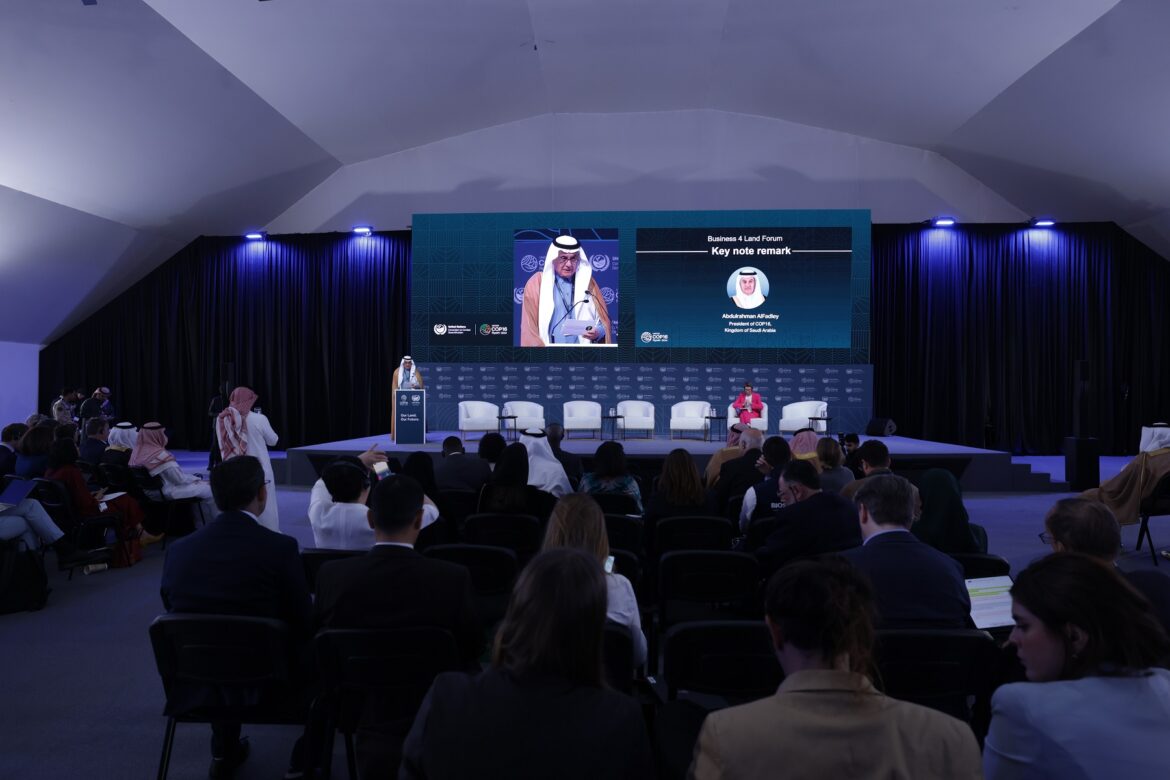In an effort to accelerate land restoration financing, Saudi Arabia’s UNCCD COP16 Presidency called for the private sector to ‘ramp up’ funding, after a UNCCD report highlighted only 6 per cent of financial commitments for land resilience and drought restoration came from private sources.
UNCCD have also highlighted the cost of inaction, with the potential for the global economy to lose $23 trillion by 2050 due to land degradation, desertification and drought.
On the 4th December, Saudi Arabia’s Presidency launched Land Day, the first of seven thematic days designed to focus on key areas within land degradation, desertification and drought. One of the central matters driving debate during the day concerned the urgent need to unlock private sector investment to mobilise international resources for land restoration.
Key events took place on Land Day to amplify awareness and action – the Business for Land forum brought together decision-makers from business, government and civil society to explore the intersection of business, finance and policy, and promote private sector engagement in addressing land degradation.
“Through our Presidency of COP16 we will work to make this COP a launchpad to strengthen public and private partnerships and create a roadmap to rehabilitate 1.5 billion hectares of land by 2030″, said Abdulrahman Abdulmohsen AlFadley, UNCCD COP16 President and Saudi Arabia Minister of Environment, Water, and Agriculture.
Following a series of events this year at the UN General Assembly, the CBD COP16 in Cali, Colombia and COP29 in Baku, Azerbaijan, the ‘Rio Convention Synergies’ dialogue also took place on Land Day, highlighting developments made during the 2024 Rio Trio events. The event discussed the interconnected issues driving land degradation, biodiversity loss and climate change, and how to find common solutions.
“If the international community is to deliver land restoration at the scale required, then the private sector simply must ramp up investment”, said Dr. Osama Faqeeha, Deputy Minister for Environment, Ministry of Environment, Water and Agriculture, and Advisor to the UNCCD COP16 Presidency. “As the latest UNCCD findings show, there remains a worrying blackhole in the funds needed to combat land degradation, desertification and drought”.
“For decades businesses have profited from land, now is the time to embrace restoration and invest in futureproofing the foundations of businesses, industries and whole economies. At COP16 in Riyadh we are working to mobilise both the public and private sector, to further incentivise investment, and ultimately, help unlock a potential trillion-dollar restoration economy.”
The day also outlined the unique issues facing different types of land around the world, and the potential solutions to arrest their degradation. From forests to rangelands, which are natural grasslands used by livestock and wild animals to graze and forage. Rangelands also include savannas, shrublands, wetlands, tundra and deserts, and account for approximately 54 per cent of all land cover according to the UNCCD.
During Land Day discussions on ‘Protecting and Restoring Rangelands’ took place to mobilise investments in the preservation, protection, and restoration of global rangelands. Sessions offered participants insights into science-backed solutions for combating land degradation and drought, and the crucial role of finance in the circular economy.
“Rangelands are a vital ecosystem for people around the world, nurturing lives and livelihoods”, added Dr. Faqeeha. “However, they are facing acute degradation with over 50 per cent of rangelands already degraded. This is having a drastic impact, putting at risk 1/6th of humanity’s food supply and 1/3rd of the planets carbon reservoir. The continued depletion of these vital lands is driving food insecurity, climate change, biodiversity loss and forced migration.”




